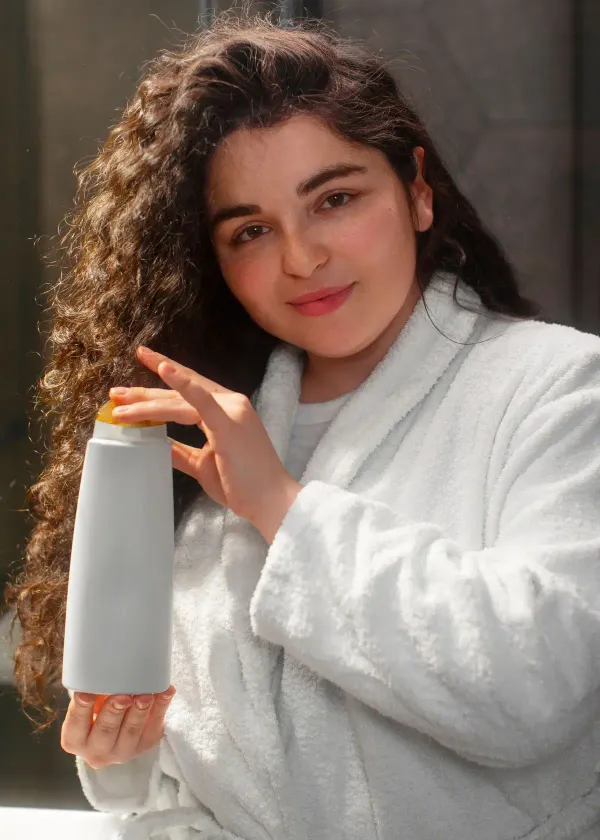Shampoos that promise silky hair are a hot favorite among beauty lovers. Who doesn't want smooth, luscious locks that feel like a dream? But the million-dollar question is—are these shampoos suitable for everyone? This blog post will explore whether shampoos designed for silky hair can cater to various hair types, including curly, oily, and dry strands. We'll also offer practical tips and insights to help you make an informed choice.
What Makes a Shampoo Suitable for Silky Hair?
Shampoos formulated for silky hair often include ingredients like silicones, proteins, and natural oils. These elements work together to coat the hair shaft, reduce frizz, and add shine. Silicones, like dimethicone, make hair feel smooth but can build up over time, causing a limp appearance. Natural oils like argan or coconut oil nourish and moisturize, making the hair shiny and soft. Proteins, such as keratin, help strengthen the hair, reducing breakage and split ends.
Is Silky Hair Shampoo Good for Curly Hair?
Curly hair is naturally more prone to dryness and frizz. While shampoos for silky hair can help reduce frizz, they might not provide the deep hydration that curly hair demands. Curly hair benefits most from shampoos that focus on moisture and curl definition. A shampoo that makes hair silky might contain silicones and sulfates, which can strip natural oils from curly hair, making it even drier.
However, some silky hair shampoos are designed with curly hair in mind. These formulations often include humectants like glycerin, which attract moisture to the hair, and natural oils that offer hydration without weighing down the curls. If you have curly hair and want to try a silky hair shampoo, look for one that's sulfate-free and rich in natural oils.
How Does Silky Hair Shampoo Affect Oily Hair?
Oily hair comes with its own set of challenges, such as excessive sebum production and a greasy scalp. Shampoos for silky hair may contain moisturizing ingredients that could exacerbate oiliness. For oily hair, a lightweight, clarifying shampoo is usually recommended to remove excess oil without stripping the hair of its natural moisture balance.
That said, there are silky hair shampoos formulated specifically for oily hair. These products typically contain lightweight conditioners, avoiding heavy oils and silicones that can make oily hair appear even greasier. If you have oily hair and still want the benefits of silky hair shampoo, opt for a formulation that offers lightweight hydration and oil control.
Can Dry Hair Benefit from Silky Hair Shampoo?
Dry hair can significantly benefit from a shampoo designed to make hair silky. These shampoos often include moisturizing ingredients that can help hydrate and smooth dry, brittle hair. Natural oils, proteins, and humectants in silky hair shampoos can help lock in moisture, reduce frizz, and give dry hair a softer, more manageable texture.
However, it's essential to choose a shampoo free from harsh sulfates, which can further dry out your hair. Look for formulations that emphasize hydration and repair, and consider pairing your shampoo with a deeply moisturizing conditioner or hair mask for optimal results. If you have dry hair, a silky hair shampoo can work wonders, provided it has the right ingredients.
Shampoos designed for silky hair can be beneficial for various hair types, but they are not one-size-fits-all solutions. Curly hair needs hydration and curl definition, oily hair requires lightweight, non-greasy formulations, and dry hair benefits from intense moisture. Understanding your specific hair needs and carefully reading ingredient labels can help you find the right silky hair shampoo for you.
When it comes to searching for the perfect shampoo to achieve silky hair, our thorough research has identified the Best Shampoo for Silky Hair just for you. Now it’s your chance to experience the remarkable benefits! Click the link to explore our top picks and enhance your hair care routine. Discover shampoos designed to deliver exceptional smoothness and shine, ensuring your hair looks and feels its absolute best every day.
What are some natural ingredients that promote silky hair?
Natural ingredients that promote silky hair include argan oil, coconut oil, and shea butter, which provide intense hydration and smooth the hair cuticle. Aloe vera and honey add moisture and shine, while apple cider vinegar helps balance the scalp's pH, leading to healthier hair. Herbs like rosemary and chamomile can strengthen hair and enhance its luster. Besides, rice water is known for its amino acids, which improve hair texture. These ingredients, when included in shampoos, can transform dry, frizzy hair into soft, silky strands.

What are some professional tips for using shampoo for silky hair?
To maximize the benefits of shampoo for silky hair, use lukewarm water to wash and rinse, as hot water can strip natural oils. Apply the shampoo to your scalp and massage gently to stimulate blood flow and promote healthy hair growth. Rinse thoroughly to avoid residue, which can weigh hair down. Follow with a matching conditioner to enhance smoothness and shine. For added silkiness, incorporate a weekly deep conditioning treatment or hair mask. Finally, limit the use of heat styling tools and always apply a heat protectant before styling.

How can I use shampoo for silky hair to add volume?
To add volume while using shampoo for silky hair, focus on applying the product primarily to your scalp and roots. Massaging the shampoo into your scalp can help lift the roots and create a fuller appearance. Rinse thoroughly to ensure no residue weighs down your hair. Use a lightweight conditioner, applying it only to the ends to avoid flattening the roots. After washing, blow-dry your hair upside down or use a volumizing mousse to enhance lift. These techniques help achieve a balance of silky texture and increased volume.

How often should I switch shampoos to maintain silky hair?
Switching shampoos every few months can help maintain silky hair by preventing product buildup and addressing changing hair needs. Rotating between different formulations ensures that your hair receives a variety of nutrients and avoids becoming overly accustomed to one product. If you notice your hair becoming less responsive to your current shampoo, it's a good indicator to try something new. However, if you find a shampoo that consistently delivers great results, you don't need to switch unless you encounter issues like buildup or changes in your hair's condition.

Should I use a leave-in conditioner after shampooing for silky hair?
Using a leave-in conditioner after shampooing for silky hair can provide additional moisture, reduce frizz, and enhance manageability. Choose a lightweight, non-greasy formula that complements your shampoo to avoid weighing down your hair. Apply the leave-in conditioner to damp hair, focusing on the mid-lengths and ends where hair is typically drier. This step helps lock in hydration, adds shine, and protects your hair throughout the day. Incorporating a leave-in conditioner into your routine can significantly improve the softness and silkiness of your hair, especially for those with dry or damaged strands.
Can I use shampoo for silky hair every day?
Using shampoo for silky hair every day is generally not recommended, as it can strip your hair of its natural oils, leading to dryness and potential damage. Instead, aim to wash your hair 2-3 times a week to maintain its moisture balance. On non-wash days, consider using a dry shampoo to refresh your hair and absorb excess oil. If daily washing is necessary due to your lifestyle or hair type, choose a gentle, sulfate-free shampoo formulated for frequent use. This approach helps keep your hair clean while preserving its silkiness and overall health.







